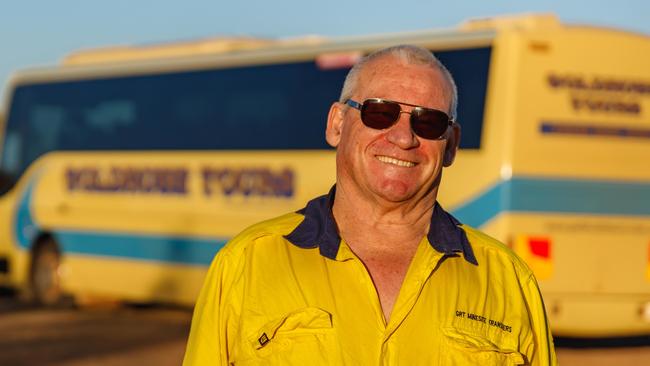Hearts break and break down more often in the bush, new report shows
The Best for the Bush research has found stroke and cardiac arrest are much higher in rural and remote Australia.

Steve Mogridge has one complaint regarding the Royal Flying Doctor Service when he was flown from remote WA after suffering a stroke last year.
“The window was too high so I couldn’t see the beautiful landscape outside,” he laughs. “I’m joking, they are bloody lifesavers, it was like flying with the angels.”
Mr Mogridge, a coach driver from the mining town of Kalgoorlie was driving a manual ute on the remote Goldfields Highway early on into a 500km trip when he felt “the left side of my body went completely limp”.
He was on his way to Wiluna, another mining town on the edge of the Western Desert – the gateway to the Canning Stock Route – when not far out from the closest small town of Leonora, things started to go wrong.
“I was about 50km out from Leonora when I called my wife and said ‘I think I’m having a stroke’. She jumped in the car while I had to roll the ute into town and dragged myself into the small hospital, which just has the very basics when it comes to medical equipment and within 90 minutes I was in Perth in an MRI machine.”
Leonora is more than 800km away from the state-of-the-art hospital and specialists Mr Mogridge needed. Without the Royal Flying Doctor Service, he doesn’t wish to think about what could have happened.
“My mum passed away from the same thing more than 20 years ago, still makes me tear up thinking about it. I’m a mummy’s boy. But what those people did for me, I can never repay them or thank them enough. It’s not just the health services or the nurses, it was their amazing bedside manner from everyone including the pilot who came over and squeezed my shoulder and said ‘Don’t worry Steve we’re going get you the help you need as quickly as we can’ to the nurses who had to monitor my low blood pressure the entire trip. It was below 70 when we reached Perth and it took them 45 minutes for them to stabilise me.”
The RFDS provides about 35,000 aeromedical retrievals every year, on behalf of the commonwealth and state retrieval partners – transporting those living, working and travelling in rural and remote Australia to the urgent hospital care they need.
New research, commissioned by New Corp Australia’s Best for the Bush, has found stroke and cardiac arrest are much higher in rural and remote Australia.
The most common call-outs for the RFDS in the bush is in response to heart, stroke and vascular disease. According to a new report published on Wednesday, these conditions account for almost a quarter of all RFDS aeromedical retrieval. “People living in remote and very remote areas are overall 1.4 times as likely to die from heart, stroke and vascular disease,” the report says.
Based on these new findings from the Best for the Bush In‑Focus report, the RFDS is now getting to work to partner with governments, service providers and local communities to help deliver more equitable access to comprehensive primary healthcare services in rural and remote areas, including cardiac care.




To join the conversation, please log in. Don't have an account? Register
Join the conversation, you are commenting as Logout